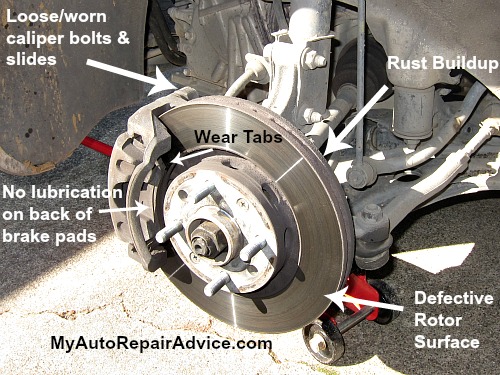What Causes Squeaking Brakes?
Squealing or squeaking brakes can be annoying, embarrassing and even worrisome. There are many different things that can cause your brakes to squeal. Some causes are not important and won't cause any safety problems at all while others are indicative of major problems that need to be taken care of right away. Let's take a look at some of the most common things that can cause these ear piercing brake noise.
Keep in mind that you might need to take your vehicle out for a test drive to find out when exactly the brake noises occur. Are you encountering squealing brakes when driving, when braking or only in cold weather?
To help you figure out what's wrong with your brakes, I will list some of the most common causes below and probably save you an expensive trip to the mechanic. Here are the things you will need to pay attention to while diagnosing this problem:
What Causes Squeaking Brakes on a Car?
To troubleshoot, repair and maintain your vehicle, you'll need diagnostic and repair information that is specific to your car or truck. For this I personally use and recommend ALLDATAdiy. With full manuals for over 30,000 vehicles online, you will find an exact match for your vehicle's year, make and model.
Besides being cheaper than a factory manual, they also offer step by step repair instructions and detailed diagrams beyond what is found in most printed manuals. Click here for a sample of their diagnostic and repair information.
1. Worn Out Brake Pads
Almost all new brake pads will come with a small metal device attached to them called "wear tabs". These little tabs are probably the most common cause of squeaky brakes.
In fact, that is exactly what they are
supposed to do. These wear tabs are set up so that they will start
making an awful squealing noise when the brake pads are almost
completely worn out. This is simply to let the driver (or their
mechanic) know that the brake pads are in need of replacing. The best
way to find out if this is the cause of your brake squeaking is to check your brake pads to see if they are worn out.
2. Insufficent Brake Lubrication
When your brakes were installed they should have been lubricated in several places: on the brake pad backing plate, on all sliding surfaces including the caliper bolts and on the brake caliper piston.
If this was not done or if this lubrication has simply worn off, it can cause squeaking brakes. This is a tough one to figure out without removing the wheel and brake caliper. It usually takes someone who has the experience to know whether there is enough lubrication left to keep the brakes quiet.
If you look at your brakes and you see a lot of dry dust
and no lubrication then you should have your mechanic check it out. This
could be the cause of your squeaky brakes.
3. Defective Rotor Surface
A brand new rotor is shiny and smooth. Over time this new, shiny, smooth surface gets worn by the brake pads and gets repeatedly heated and cooled by the driver using the brakes. Sometimes this can cause rocks, pieces of the brake pads or other debris to get lodged into the brake rotors. This can cause squealing brakes.
The best way to check for this is to remove your tire and inspect the braking surface carefully. Another thing that can cause brake noise is rust buildup on the rotors. The rust can sometimes build up enough so that it is contacting parts of the caliper, or pieces can break off of the rotor and get lodged between the brake pads and the rotors causing squealing brakes.
If you
take your tire off and find a large amount of rust built up on the
rotors you can take a file and file the rust off. This will ensure that
the rust is not causing your brake to squeal.
Squealing Brakes When Driving or Braking?
The above are the most common causes of squeaking brakes. If you notice the noises only when you are braking you will probably find the problem to be something with the caliper or brake pads.
Since the pads and caliper only contact the rotor when the brakes are applied (at least that is what they are supposed to do), you know that they are not likely to be the cause of the problem when you are not braking (though there are rare exceptions).
If you find that the squeaking brakes happen all the time then you are probably looking for something with the rotor or the brake shims. Sometimes the brake shims can cause noises because of the vibration of the caliper while driving. While many times this noise is noticeable only while braking in some cases it can also occur when driving and not braking.
Another thing to remember is that if it has been a very
long time since your last brake job you simply might need new brakes. In
many cases the only cause of this problem is that they are just old.
If you still have any unresolved vehicle problems or questions, you can ask an auto mechanic online. For expert answers specific to your vehicle's make and model, I recommend JustAnswer Car. They have a large pool of certified mechanics to answer your questions for a small fee and you can also browse their answers to other users for free.
BRAKE PROBLEMS - Causes and Fixes

New! Comments
Have your say about what you just read! Leave me a comment in the box below.